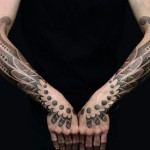The next NRG seminar will take place at 5pm on Wednesday 13th March in F108, where Dr Matthew Freeman (Bath Spa) will be speaking on ‘Transmedia Historiography as Educational Practice: Narrativising Colombian Cultural Memory Across Media’. Abstract and biography are attached below. All welcome. To find out more about NRG please visit https://research.bournemouth.ac.uk/centre/journalism-culture-and-community/
Biography
Dr Matthew Freeman is Reader in Multiplatform Media at Bath Spa University. He is Deputy Director of the University-wide Centre for Cultural and Creative Industries, Co-Director of the Centre for Media Research, and leads the University’s Communication, Cultural and Media Studies submission to REF2021. His research examines cultures of production across the borders of media and history, and he is the author/editor of seven books: The World of The Walking Dead (2019), Transmedia Archaeology in Latin America(2018), The Routledge Companion to Transmedia Storytelling(2018), Global Convergence Cultures(2018) Historicising Transmedia Storytelling (2016),Industrial Approaches to Media (2016), and Transmedia Archaeology (2014). He has also published over 30 journal articles and book chapters, is Series Editor for the Routledge Advances in Transmedia Studies book series, and sits on the editorial board of the journal Convergence. He is the co-founder and co-editor of the International Journal of Creative Media Research, a new journal which aims to push forward the potentials for publishing creative and practice-based research.
Abstract
People now engage with media content across multiple platforms, following stories, characters, worlds, brands and other information across a spectrum of media channels.Yet both the biggest challenge and the biggest opportunity for understanding transmediality – itself the use of multiple media technologies to tell stories and communicate information – is the sheer breadth of its interpretation. Though primarily still seen as a commercial practice, this talk explores the application of transmedia practices to the communication of history across multiple media platforms, questioning what this approach means to our understandings of transmediality. More specifically, the talk furthers discussions of the contribution that transmedia storytellingcan make to educational practices, identifying new strategies for how transmediastorytelling is now being used to capture and narrativize historical memories, as media-based educational resources. To do so, the talk focuses on the Colombian armed conflict and the Desarmados project, for which I served as a member of the project team, and for which in this context to theorise how transmediality can work as socially progressive and emotionally supportive form of historiography. Desarmados is an internationally-funded research project which aims to harness commercial ideas about digital platforms and transmedia storytelling as tools for documenting the Colombian citizens of Medellín and for narrativizing their memories of the Colombian armed conflict as an educational resource. A transmedia project supported by the Colombian Ministry of Culture and the Colombia Government, Desarmados seeks to reconstruct the cultural memory of the Colombian armed conflict, and develop workshops with secondary schools in Medellin to help test out new transmedia materials as modes of social enterprise between survivors and civil society.
As such, this talk will interrogate not the history of transmedia storytelling, but rather how the working practices of transmedia storytelling can deal with history, creatively and socially. Desarmados, I argue, exemplifies not only a new way of experiencing and remembering Colombian history, but as that which reshapes said Colombian history for the better.
 Narrative Research Group Seminar Series
Narrative Research Group Seminar Series










 UK Turing Scheme: My student mobility programme in Nepal
UK Turing Scheme: My student mobility programme in Nepal Bournemouth University psychologists publish new book
Bournemouth University psychologists publish new book Connecting Research with Practice: FoodMAPP Secondment in Austria and France
Connecting Research with Practice: FoodMAPP Secondment in Austria and France Health promotion paper read 8,000 times
Health promotion paper read 8,000 times The Beautiful Work Challenge: On Birth
The Beautiful Work Challenge: On Birth MSCA Postdoctoral Fellowships 2025 Call
MSCA Postdoctoral Fellowships 2025 Call ERC Advanced Grant 2025 Webinar
ERC Advanced Grant 2025 Webinar Horizon Europe Work Programme 2025 Published
Horizon Europe Work Programme 2025 Published Horizon Europe 2025 Work Programme pre-Published
Horizon Europe 2025 Work Programme pre-Published Update on UKRO services
Update on UKRO services European research project exploring use of ‘virtual twins’ to better manage metabolic associated fatty liver disease
European research project exploring use of ‘virtual twins’ to better manage metabolic associated fatty liver disease